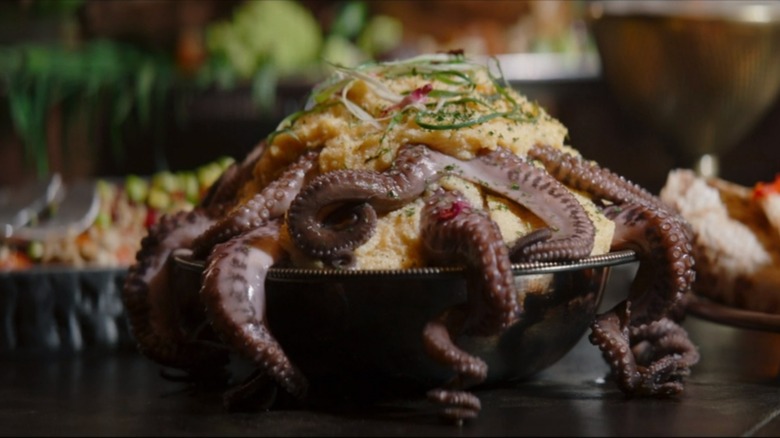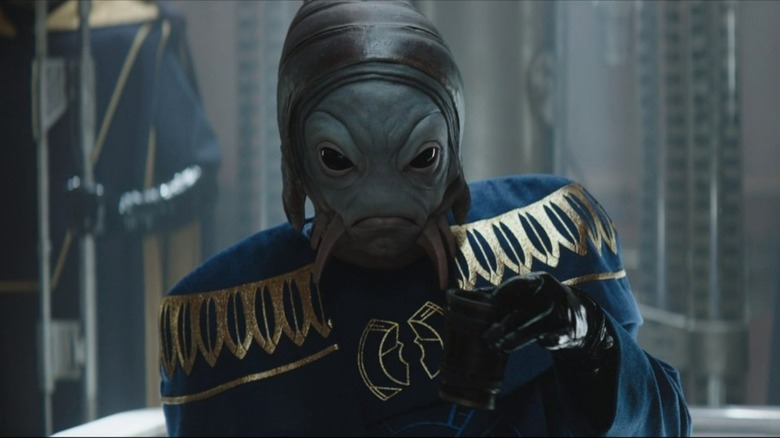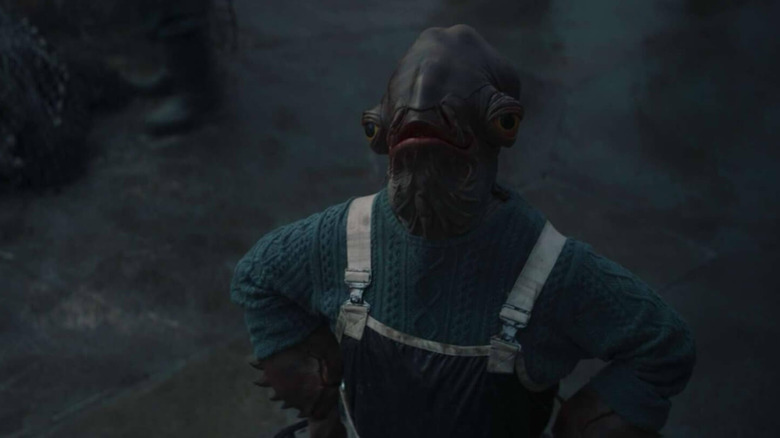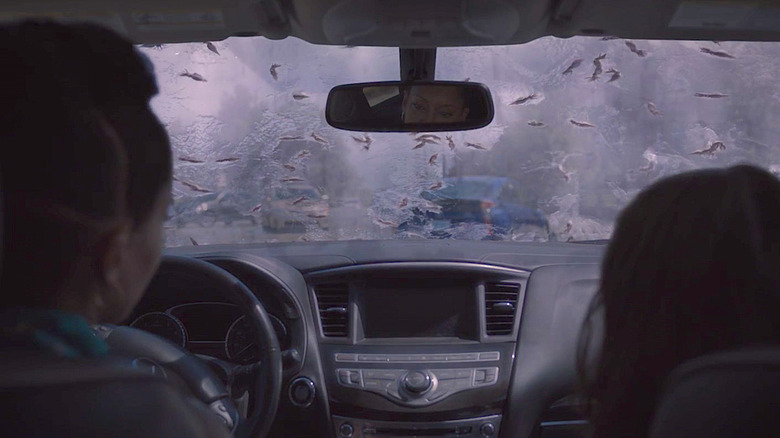How Calamari Ended Up On Tatooine In The Book Of Boba Fett: An Investigation
This article contains spoilers for the latest episode of "The Book of Boba Fett."
Like any story told in the sprawling "Star Wars" universe, "The Book of Boba Fett" has left us with plenty of intriguing details and questions to ponder. Chief among them remains the fascinating tension at the core of this new spin-off series, particularly when it comes to depicting Boba Fett as the ruthless bounty hunter of the original trilogy versus this new "Man with a code" version who clearly has rules, a conscience, and a leadership style based on morals (as far as that can apply to crime lords, at least), which we've written about before. Unfortunately, a number of fans have also glommed onto a more surface-level criticism regarding the speeder bike gang introduced in Episode 3, "The Streets of Mos Espa." Allegedly, the bright color palette of their speeders and the distinctively modern trappings of the crew ought to be a deal-breaker to "real fans," people who call this an unforgivable sin that George Lucas himself never would've approved of. Thankfully, many sought to set the record straight (including this tweet by /Film's very own Peter Sciretta), redirecting the predominant discourse of this series towards a place more worthy of attention instead.
Like the crucial issue of calamari existing on the desert world of Tatooine, for instance.
Roughly halfway through the latest episode of "The Book of Boba Fett," Boba (Temuera Morrison) and his second-in-command Fennec Shand (Ming-Na Wen) have retreated to the (relative) safety of his dining room in Jabba the Hutt's former palace. While stewing over their next move in the wake of the unsuccessful attempt on his life by Black Krrsantan, the unlikely pair of outlaws enjoy the spoils afforded to crime lords. The camera pans across a feast laid out on the table, boasting all sorts of alien and exotic dishes prepared for no less a figure than the usurper to Jabba the Hutt's throne.
But such impressive attention to culinary detail invites all sorts of inevitable questions, too: namely, just what the heck is a bowl of calamari doing on the desert world of Tatooine? What are the logistics involved in importing such a high-end delicacy? Or are there other possible explanations for how a plate of squid made its way to Boba's dinner table?
Naturally, my rapid obsession with this mystery has led to this very serious article.
Something's Fishy...
You know how the saying goes: if it looks like a fish, swims like a fish, and smells like a fish, then it's probably a fish. We're going to apply that — and the idea of Occam's Razor — to the first potential answer to this little conundrum of mine. The fishlike species of Pyke (get it? Pyke? As in the fish, pike? Man, I love "Star Wars" subtlety) that makes up the antagonistic Pyke Syndicate has been giving Boba Fett headaches in both timelines of the series to this point, plaguing the safety of the Tusken Raiders in the immediate post-"Return of the Jedi" events and returning on a starliner in the episode's concluding moments to make a serious power play once more in the present. Surely, their arrival on Tatooine and the seemingly inexplicable presence of actual calamari can't be a coincidence ... can it?
I suppose it stands to reason that a species that resembles marine life to such an extent would also develop a taste for marine life in their cuisine. Given the massive amount of wealth at their disposal — the Pykes are one of the galaxy's foremost traffickers of spice, even appearing in "Solo: A Star Wars Story" to facilitate Han Solo's famous Kessel Run — the immeasurable costs in importing such food off-world wouldn't likely pose much of a problem for them. While I'm going full speed down this head-canon rabbit hole of mine, I might as well speculate that the Pykes brought in tons of seafood ahead of their return to Tatooine and some of it ended up making its way to the poor saps in charge of providing food for Boba. Now that I think about it, I kind of want another spin-off show dedicated to the black market food industry that may or may not exist in the shadows of Tatooine's criminal underbelly. I mean, if we can get shades of that in last year's Nicolas Cage-starring "Pig," why can't we get an entire "Star Wars" production about that, too?
Anyway, fishy aliens lead to fishy food, mystery solved! Or is it?
We've Had One Calamari, Yes, But What About Mon Calamari?
At the risk of painting with a broad, culturally insensitive brush here, I'm going to double down on the fish connection and point a finger at the galaxy's most famous purveyors of seafood: the Mon Calamari. When I poked fun at this franchise's unique sense of subtlety before, well, I may have spoken too soon. We've seen the imaginatively-named Mon Calamari throughout "Star Wars" media filling both possible extremes of importance — from Admiral Ackbar in the original trilogy and General Raddus in "Rogue One: A Star Wars Story" to the masses of Mon Calamari on the estuary moon of Trask, humbly trying to make a living in season 2 of "The Mandalorian." What we're presupposing is, the Mon Calamari simply have to be responsible for Tatooine's growing market of calamari.
The species has generally been depicted as friendly and peaceful ... but don't let their wide-eyed, adorably squishy-looking exteriors fool you. This impeccably fashionable species clearly must be at the heart of a vast, galaxy-spanning conspiracy that, uh, somehow involves seafood making a way onto the deserts of Tatooine. Fascinatingly, the last episode of "The Book of Boba Fett" even went out of its way to mention that Tatooine used to be covered in oceans before drying up. What if the Mon Calamari originally colonized the planet, countless years in the past, but were forced to leave once the deserts took over? Maybe they're plotting to come back and retake what was rightfully theirs in the first place!
Okay, I freely admit I'm reaching here, as there doesn't appear to be any record of Mon Calamari ever actually stepping foot anywhere near Tatooine, but our pattern-sensing brains simply can't ignore the obvious evidence right in front of us. If they didn't want to be accused of every squid-related controversy in the galaxy, maybe they shouldn't have named their entire species after literal calamari! Wake up, sheeple, and cast a more suspicious eye on the otherwise heroic depictions of Mon Calamari in "Star Wars."
Jeremy Irons' Squid Machine From Watchmen Went VERY Wrong
Whether you attribute this oft-repeated quote to Spock or Sherlock Holmes, the essence remains the same either way: "When you eliminate the impossible, whatever remains, however improbable, must be the truth."
Dear readers (or those of you who still left, at least, the troopers that you are!), we have exhausted all our possibilities and are left with what must be the truth. Of the many reasons why my mind rebelled against the image of calamari gracing Boba Fett's decadent dinner table, the sheer logistics involved in importing, preserving, and preparing such a delicate dish in the harsh, unforgiving terrain of Tatooine makes my head spin. Granted, the technology of "Star Wars" may be vastly superior to our own, but I'd need to see physical proof that squid could survive the journey — even at warp speed! — through the vastness of space and in the arid climate without spoiling.
But what if there was some device, created by the universe's most brilliant scientific mind, that somehow caused actual, literal squid to rain from the skies at any given moment at any given place? Yes, we've arrived at the "crackpot" portion of this little conspiracy theory and have now roped in another universe entirely: "Watchmen." Wouldn't you know it, the excellent and deeply compelling HBO series just so happened to feature periodic "squidfall" events, cooked up by Jeremy Irons' aged and villainous Ozymandias to remind the world of the destructive, canonical disaster that took place at the climax of Alan Moore's original graphic novel. But who's to say that his squid machine didn't simply work a little too well?
The Watchmen, of course, have a well-established history of popping up in dimensions and worlds that they're otherwise not supposed to, so is a potential "Star Wars" crossover any less realistic? Okay, an army of lawyers on both sides might disagree with that assertion, but we're desperate here. I have endured nothing but sleepless nights since noticing that Boba Fett apparently has access to high-quality calamari and, more to the point, never even bothered to eat it. All that trouble to get it to Tatooine ... for nothing!
Let this be a lesson to "Star Wars" creators — there's absolutely no detail too small or insignificant that I won't spend nearly 1500 words obsessing over in painstakingly unnecessary detail.



